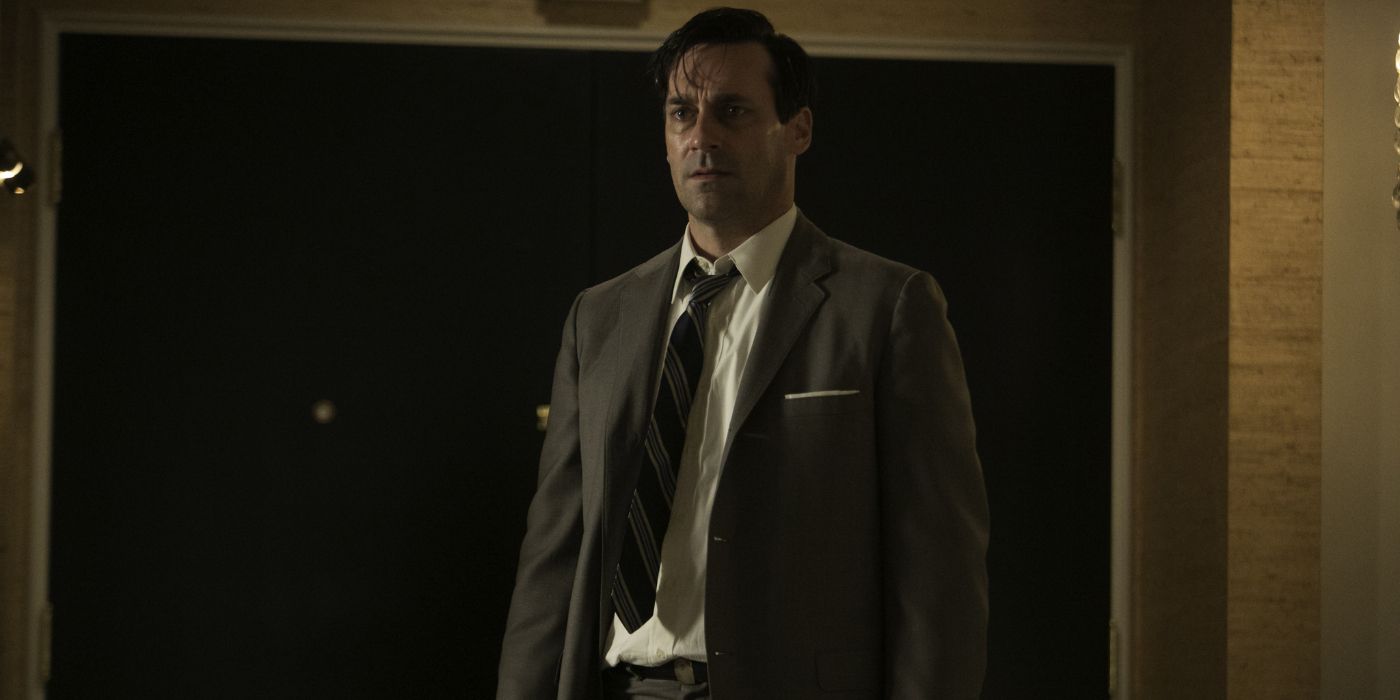The Big Picture
-
Mad Men
uses Don Draper’s character development to reflect radical shifts in American history. -
Mad Men
‘s reference to
Planet of the Apes
showcases the film’s profound impact on viewers through Don’s character growth. - The episode reflects Don’s maturation and existential crisis as an ad exec in an evolving industry.
Mad Men is easily one of the greatest drama series of all time, crafting an insightful look at a volatile historical period that exposed society’s economic, political, and ethical developments. There’s a reason that the 1960s were referred to as the “decade of change,” and Mad Men used the development of Don Draper (Jon Hamm) to show the radical shifts in American history, from the election of President John F. Kennedy in 1960 to the Apollo 11 moon landing in 1969. In addition to referencing key historical events, Mad Men often incorporated key cultural moments that defined American media. Mad Men’s Season 6 episode “The Flood” even includes a scene where Don attends a screening of the original Planet of the Apes.
Attending the screening with his young son Bobby (Mason Vale Cotton) gives Don the rare opportunity to act like a responsible father; he has spent less time with his children as a result of his divorce from his wife Betty (January Jones), and his ongoing affair with Sylvia Rosen (Linda Cardellini) has made family life even more volatile. As Planet of the Apes reaches its climactic twist ending, Don is forced to explain its ramifications to Bobby, but Mad Men also captured the magnitude of Planets of the Apes’ impact by thematically connecting the two projects.

Mad Men
A drama about one of New York’s most prestigious ad agencies at the beginning of the 1960s, focusing on one of the firm’s most mysterious but extremely talented ad executives, Donald Draper.
- Release Date
- July 19, 2007
- Main Genre
- Drama
- Seasons
- 7
- Studio
- AMC
‘Mad Men’ Depicts How Shocking ‘Planet of the Apes’ Final Twist Is
While it was based on a novel by Pierre Boulle, the final twist of Planet of the Apes took many viewers by surprise when it first debuted in theaters in 1968. Although the astronaut George Taylor (Charlton Heston) is under the impression that he’s been displaced to a faraway planet where chimpanzees have advanced intelligence, the image of the ruined Statue of Liberty lying on the beach informs him that he is still on Earth. Mad Men shows just how thought-provoking the last shot of Planet of the Apes was to impressionable viewers. Don is forced to explain the mechanics of time travel to Bobby, who is initially confused as to how a statue familiar to him could be destroyed. His understanding of the film’s implications about the future of mankind signifies a loss of innocence that is paramount to his character development.
Don’s impressed reaction emphasizes Planet of the Apes‘ merits as a great science fiction film, not just a work of blockbuster entertainment. It’s implied that Don took Bobby to the film simply to distract him, as he had little interest in its artistic value; Don expresses similar feelings of apathy when he gets his daughter Sally (Kiernan Shipka) tickets to see The Beatles performing in New York. However, Don shows that he is enamored with the film when the credits begin to roll, and even asks Bobby if he’d be interested in seeing it a second time. This captures just how much of a game-changer Planet of the Apes was, and how it brought a new level of respect to audiences. Cynical viewers like Don may have expected a “monster movie” similar to the campy Hammer films of the 1950s, but Planet of the Apes addressed serious themes about societal collapse and the failings of infrastructure.
Watching ‘Planet of the Apes’ Changes Don Draper on ‘Mad Men’
The Planet of the Apes screening occurs during a pivotal moment in Don’s character arc, as he has gradually grown less passionate about his role as a marketing director. Don had initially been enthusiastic about starting an independent agency alongside Roger Sterling (John Slattery), Bert Cooper (Robert Morse), Lane Pryce (Jared Harris), and Pete Campbell (Vincent Kartheiser) when they had fired themselves in the season three episode “Shut the Door, Have a Seat.” However, season six sees Don trapped under new leadership when Sterling Cooper Draper Pryce merges with their rivals Cutler, Gleason, and Chaough. Watching Planet of the Apes reminds Don that his actions are inconsequential; it’s unlikely that any of his advertising work will have a significant impact in his lifetime, and Planet of the Apes suggests that humanity itself will become a specter of the past.
Although he’s often associated with his brooding and cynical attitude, Don shows his maturation as a father by explaining Planet of the Apes to Bobby. While his divorce from Betty was the result of his aptitude for carrying on with affairs, Don does still seem to have genuine empathy for his children. Sally may have been exposed to the darker aspects of his personality, but Don realizes that he still has the chance to be a hero in Bobby’s eyes. The powerful image of father and son enjoying Planet of the Apes together serves as the perfect lead-up to the Season 6 finale “In Care Of,” in which Don takes his children to his childhood home.
‘Mad Men’ Reflects the Themes of ‘Planet of the Apes’
Including a clip from Planet of the Apes reflects Mad Men’s message about the power of media. Don often posits the phrase that “advertising is happiness,” indicating that just because something he produces is meant to be broadly accessible, that doesn’t mean that it can’t contain profound ideas that provoke introspection. Planet of the Apes has the same value as any of Don’s advertising campaigns; while it was a successful film that kickstarted a franchise, it also provoked nuanced discussions about its thematic undertones.
Planet of the Apes and Mad Men both express the passage of time. While Mad Men used the nuanced world of advertising to analyze the evolution of American values, Planet of the Apes showed that mankind itself was just a brief blip within the entirety of existence. Don has many strong qualities, so it’s good to know that he’s also a cinephile.
Mad Men is streaming on AMC+ in the U.S.


